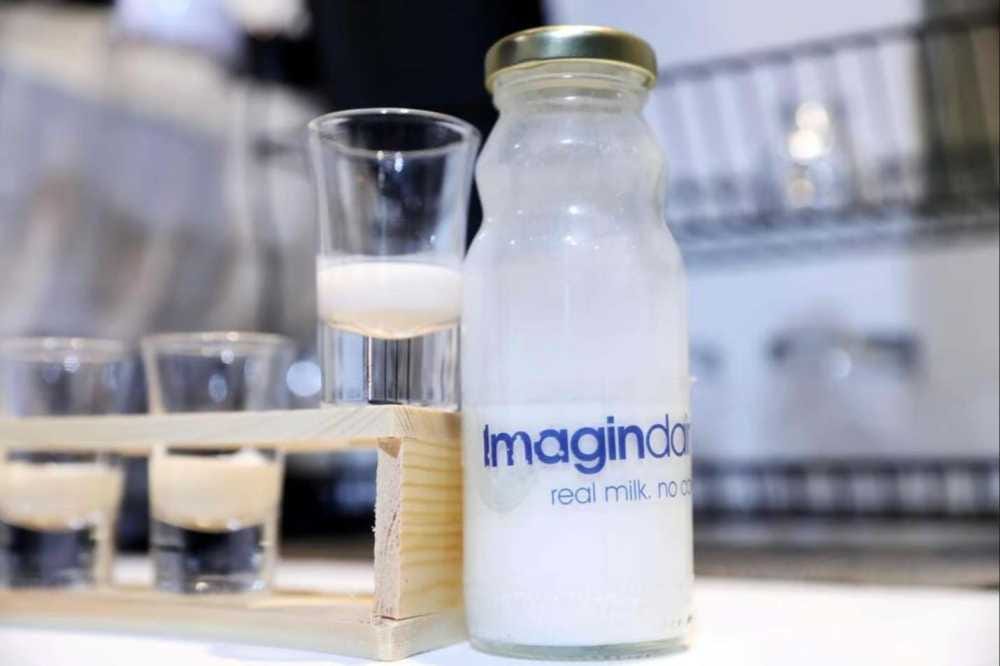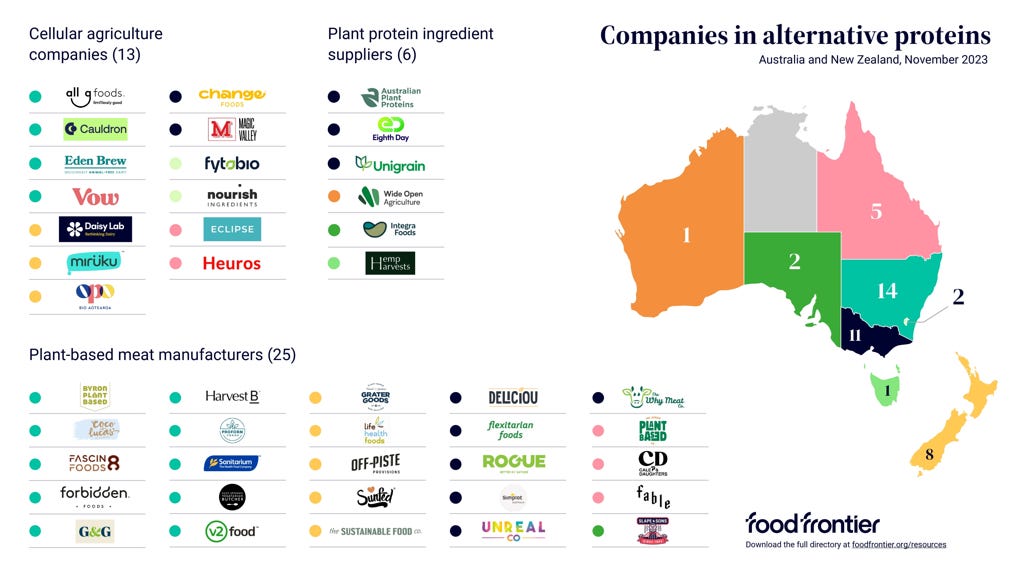Imagindairy Secures FDA Clearance, Australia’s Alt Protein Surge, and the Massive Economic Potential of Alt Proteins
Also: Michael Jackson can influence your diet
Hello and happy 2024! 🥳
I’m back after taking three weeks off to recharge and spend some much-needed time with my family back home in Sri Lanka. I hope your holiday season was equally amazing and filled with joy!
As we head into this new year, I'm filled with optimism and excitement. I'm looking forward to all the incredible things you will achieve in 2024. We have a year full of possibilities ahead of us! 🙌🏾
BIO BUZZ
🥛 Imagindairy received US regulatory approval for its animal-free dairy proteins
This approval, in the form of a "no questions letter" from the FDA, makes Imagindairy the third company, alongside Israel’s Remilk and California's Perfect Day, to attain such clearance for animal-free whey protein.
The Israeli food tech startup's co-founder and CEO, Eyal Afergan, expressed the company's readiness to supply this innovative ingredient to food manufacturers, aiming to offer dairy experiences without relying on traditional livestock.
With the FDA clearance secured, Imagindairy is now seeking partnerships with food companies to introduce products like milk, cream cheese, ice cream, and yoghurt to the market, ensuring no compromise on taste, price, or consumer experience.
Read full article - The Times of Israel
🍗 THIS partners with BrewDog to introduce Europe's first skin-on vegan chicken wings
The wings are made from soy and pea protein using THIS' olive oil-based fat technology and are uniquely coated with a crispy seaweed-based "skin" to closely mimic the taste and texture of traditional chicken wings.
Unlike most chicken alternatives that focus on white meat, THIS' product aims to replicate darker chicken cuts like wings and thighs, featuring three patent-pending technologies and resulting from two years of R&D.
The vegan wings are a limited-edition item for Veganuary, available at all food-serving BrewDog locations across the UK at 25p per wing.
Read full article - vegconomist
🍄 MYCO acquires “food industry first” facility for oyster mushroom-based protein to meet rising demand for meat alternatives
The site will be transformed into a vertical farm and a product development plant for sustainable meat alternatives, marking a “first” in the food industry for such a combined operation in the UK.
The new facility is part of MYCO's strategy to support its next growth phase, with plans to create 70 jobs in the coming years. This expansion is in response to the increasing demand for plant-based foods, and the site will uniquely integrate the growing and manufacturing processes under one roof.
Hooba, the protein developed by MYCO, is highly sustainable and made from oyster mushrooms. It is praised for its nutritional value, including essential micronutrients. Hooba has been successful in taste tests, closely mimicking real animal meat.
Read full article - vegconomist
🥩 Juicy Marbles’ plant-based whole cuts are retailing at a lower price than animal steak at Tesco
Juicy Marbles' plant-based steak is priced at £9, with a special introductory offer of £6.75 for Tesco Clubcard holders. The pricing is notably lower than comparable animal-based fillet steaks (Sainsbury’s Beef Fillet Steak retails at £10.32).
There has been a significant increase in demand for high-quality, versatile plant-based meat products, as indicated by Tesco's customer trends. This demand influenced Tesco's decision to stock Juicy Marbles' products.
Juicy Marbles is positioned as a market leader in whole-cut plant-based meats, offering products that are recognised for their quality and versatility, which has been a key factor in their retail success and consumer appeal.
Read full article - vegconomist
🫡 Ethan Brown, CEO of Beyond Meat, remains undeterred amidst market challenges and stock downturns
Despite the less-than-optimistic forecasts for Beyond Meat, Brown remains focused on his mission, emphasising perseverance and staying true to the company's mission of offering plant-based meat indistinguishable from animal protein at affordable prices.
In response to the high cost of vegan products, Beyond Meat reduced prices by 18% in Q3, aiming to attract mainstream consumers. However, this led to a gross loss in revenue and impacted stock values, indicating challenges in transitioning from early adopters to a broader market. Despite a downturn in U.S. revenues, Beyond Meat is experiencing growth in international markets, notably with products like McPlant in Europe.
Beyond Meat ended 2023 with stock prices down 29%, totaling a drop of 96% from its peak in 2019. To counter this, the company has implemented expense reduction strategies, including workforce cuts and combating misinformation about its products.
“People can say what they want, but we just keep doing the work. You just keep repeating and envisioning that and helping the team to see that, and you can get through almost anything.”
Read full article - vegconomist
💬 UPSIDE Foods’ response to inaccurate media portrayals
UPSIDE refutes the Bloomberg Businessweek story's claims, stating it contains inaccuracies and misrepresentations about their technology and strategy. They emphasise their progress towards commercial scale and criticise the article for omitting information about their successful suspension technology and focusing on less relevant aspects of their business.
The company highlights the positive reception of its cultivated chicken products from external parties and the media. They confirm the safety of the products, which have been reviewed by the FDA, and note advancements in reducing lead levels and developing next-generation tissue cultivators.
UPSIDE addresses misleading information and quotes from anonymous sources in the Bloomberg article. They express their commitment to being a transformative force in the industry, focusing on innovation and sustainable future goals, despite challenges and misrepresentations.
Read full article - UPSIDE Foods
MACRO STUFF
🇦🇺 Australia is emerging as a prominent player in alternative proteins thanks to innovation, government support, and market strategies
Plant-based meats could generate AU$3 billion in sales and create 6,000 full-time jobs in Australia by 2030. The broader plant protein sector, including dairy milk alternatives, bakery ingredients, and sports nutrition, could contribute an additional AU$3 billion.
There’s an increase in government discussions and papers featuring alternative proteins, a topic previously absent from policy before 2018. The foodservice sector, in particular, has seen notable growth despite recent geopolitical and financial challenges.
The range of alternative protein products has expanded significantly, with a growing number of companies and products available in Australian supermarkets, and the country is on the verge of approving its first cell-cultivated meat product for sale (Vow Foods’ cell-cultured Japanese quail).
Read full article - Green Queen
🌱 The president of the WHO urged a shift to plant-based diets, citing their potential to address both global health and climate crises
Emphasising the dual benefits, he highlighted that plant-based diets could save up to eight million lives annually and are key to mitigating climate change. The WHO is committed to helping countries implement policies to improve diets.
Despite evidence supporting plant-based diets, meat industry lobbyists at COP 28 promoted a “pro-meat message,” criticising the UN for adopting an “anti-beef strategy.” This contrasted with the consensus at the COP summit, where over 130 countries signed a declaration to integrate food system transformation into climate plans.
The UN and the scientific community underscore the link between food systems, climate change, and human health, advocating for a shift in food production and diets. Research shows that plant-based diets can reduce the risk of several diseases and are crucial for addressing the climate crisis and food insecurity.
“Together, we can protect and promote the health of both the people and the planet.” - Dr. Tedros Adhanom Ghebreyesus, President of the World Health Organization (WHO)
Read full article - vegconomist
🍄 Mycelium could be an environmentally sustainable and nutritious solution to world hunger
The study highlights mycelium as a nutritionally rich meat alternative, providing high-quality proteins, fibres, essential micronutrients, and potential health benefits such as improved immune response, blood sugar management, appetite suppression, and cholesterol reduction.
Mycelium production is environmentally sustainable, reducing the carbon footprint, water use, and land use compared to animal-sourced foods. It also helps in reducing food waste through fermentation.
With the potential to compete with animal proteins cost-effectively, mycelium is being explored by food companies for a variety of meat alternatives, offering a promising solution to protein diversification, malnutrition, and climate change challenges.
Read full article - vegconomist
🚧 Cultivated meat is facing challenges, but that doesn’t mean it’s time to give up
Upside Foods, a leader in cell-cultivated meat, has faced criticism for not meeting its own goals and promises, with reports from Bloomberg and WIRED suggesting the company has underperformed despite significant investment.
Despite criticism, Upside Foods has achieved significant milestones, such as receiving regulatory approval from the USDA and FDA for its cell-cultivated chicken breast. The company's efforts contribute to a larger goal of reducing animal suffering in factory farming, which is a significant ethical concern.
The development of cell-cultivated meat offers potential environmental benefits, like reduced greenhouse gas emissions and lower water usage, compared to traditional meat production. It also addresses health concerns associated with factory-farmed meat, like the risk of carcinogens and antibiotic-resistant bacteria.
Read full article - Fast Company
🫁 A plant-based diet significantly reduces air pollution, leading to fewer premature deaths
Researchers found that a shift to plant-based diets could prevent up to 236,000 premature deaths annually, as agriculture, particularly animal farming, is a key contributor to air pollution and represents one-third of human-made greenhouse gas emissions.
The positive impact of adopting plant-based diets is more pronounced in densely populated and agriculture-intensive areas. Europe, North America, and Eastern Asia could see reductions in premature mortality by 9-21%, 12-18%, and 4-10%, respectively, due to improved air quality from reduced emissions.
Besides health benefits, transitioning to plant-based diets offers economic advantages. The study found that a global shift to a vegan diet could increase global GDP by more than 1% or US$1.3 trillion, mainly due to enhanced labour productivity and reduced environmental impact.
Read full article - Green Queen
🔮 Green Queen Media founding editor Sonalie Figueiras' predictions and expectations for 2024’s future food landscape
Funding diversification in the food industry: Advocating for more varied and substantial funding sources for the alternative protein industry, including public money, grants, and creative investment schemes, to move beyond reliance on venture capital.
Organised industry-wide action: The call for a more organised effort within the protein diversification space to combat misinformation and lobby for better regulation.
Impact of Ozempic on the food industry: The increasing use of weight-loss drugs like Ozempic, which reduce appetite and interest in unhealthy foods, is expected to significantly influence food consumption patterns.
Read all predictions and trends - Green Queen
New here? Devour the free subscription and join a list of founders, investors, and biotech enthusiasts leading the food revolution!
BIO BUCKS
💰 The direct and indirect economic potential of alternative proteins
The majority of investments in the alternative protein industry have been from private sources, but public investments are crucial for long-term research and development (R&D), as well as maximising public benefit. Public investments catalyse progress in areas where private companies, focused on short-term profits, may not invest.
Alternative proteins are projected to significantly grow, potentially reaching a global market value of USD 290 billion by 2035. This growth can lead to substantial economic benefits, including job creation and revenue generation. For instance, the UK's cultivated meat industry alone could create thousands of jobs and generate hundreds of millions in tax revenues.
Alternative proteins also offer indirect economic benefits by addressing health issues, food insecurity, and climate change. Investing in alternative proteins is increasingly seen as a climate-smart choice, potentially yielding higher CO2eq savings per dollar than other industries (three times higher than the comparable return in the cement, transport, or aviation industry).
Read full article - ProVeg
🥛 Perfect Day's founders are stepping down, with the company finalising a ~$90M pre-Series E round and appointing interim CEO
The founders are leaving without retaining board seats or disclosing their financial positions, marking a significant change in the company's leadership structure.
Perfect Day is hinting at an imminent collaboration with a major CPG company to use its fermented whey protein, and it is also developing new molecules through its nth bio enterprise.
With an ongoing executive search for a new CEO, interim CEO TM Narayan, a strong candidate for the role, is expected to guide Perfect Day towards profitability. The pre-Series E funding was partly supported by existing investors, with additional capital from other investors
Read full article - AgFunder
SOCIAL FEAST
🧭 A letter from an investor to food tech founder on navigating the current challenges and opportunities
Hon Mun advises careful scrutiny of cash-burn models and suggests different strategies depending on the company's financial situation. For those with sufficient cash, it's recommended to continue validating their product or technology, while cash-strapped companies should streamline operations and consider alternative financing and partnerships.
The letter urges companies to pressure-test their value propositions and focus on portfolios, partnerships, and people as key pillars for long-term success. It also suggests that attracting new talent with stock incentives could be a strategic move in light of downsizing and lower valuations.
Hon Mun emphasises the importance of maintaining a steadfast focus on the company's vision, being adaptable, and persevering with determination. The letter concludes with a message of resilience and wisdom, encouraging founders to learn from each tech boom and bust cycle.
Read full letter on LinkedIn - Hon Mun Yip
🕺🏻 How Michael Jackson can influence your diet
A new study shows that consumers have reservations about the safety, nutrients, and “unnatural” aspects of cell-cultured (cultivated) beef, indicating a general neophobia or distrust towards new food innovations like cultivated meat.
Incorporating Michael Jackson's “Earth Song” as a part of the study significantly increased consumers' willingness to pay for cultivated meat by approximately 40%.
This suggests that environmentally-themed music can effectively communicate environmental issues, evoke feelings of guilt and responsibility, and boost enthusiasm for environmental protection, thereby influencing consumer behaviour.
Read full post on LinkedIn - Sophie Attwood
👩🏻⚖️ A food law expert's guide to navigating industry regulations and significance
Food law includes regulations and standards governing the food industry aimed at protecting public health, preventing foodborne illnesses, and promoting fair trade practices, enforced at international, national, and regional levels.
This includes regulations on food safety, quality assurance, traceability, labelling, and the use of additives and novel ingredients, all designed to ensure the safety and integrity of food products.
Compliance is critical for businesses in the food industry to avoid legal consequences, reputational damage, and loss of consumer trust while ensuring consumer safety and maintaining product quality.
Read full article on LinkedIn - Mathilde Do Chi
Got a taste for this newsletter? Dish it out to your friends!👇🏾
EAR FOOD
🎙 Why our brains don’t fear climate change enough
Show: The Happiness Lab with Dr. Laurie Santos
Host: Dr. Laurie Santos
Guest: Dan Gilbert, Harvard psychologist
Our brains are better at responding to immediate, tangible threats like a saber-toothed tiger attack, not gradual and indirect threats like climate change, due to evolutionary development.
Feelings of anxiety and helplessness about climate change often lead to denial, but confronting these emotions and taking even small actions can foster optimism and a sense of empowerment.
Understanding our psychological biases towards climate change can aid in creating effective strategies, such as leveraging social norms, but systemic changes and political action are crucial for a significant impact.
THAT’S ALL FOR THIS WEEK!
Take care, and have an awesome week! 🙌🏾
Are you new here?
Know any other geeks who would dig this newsletter?










